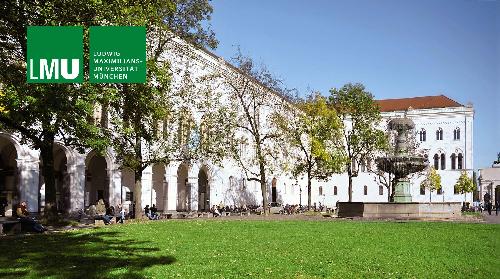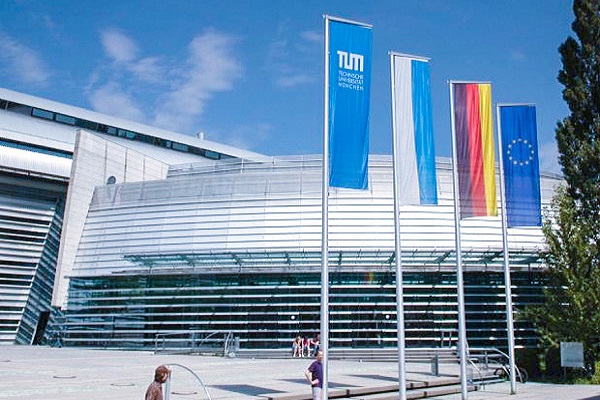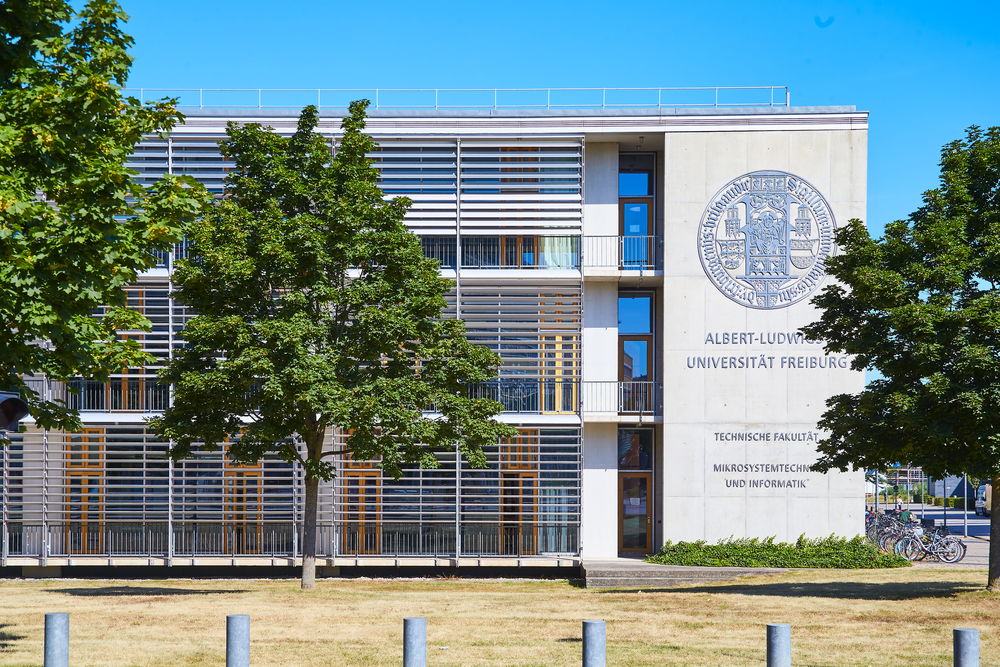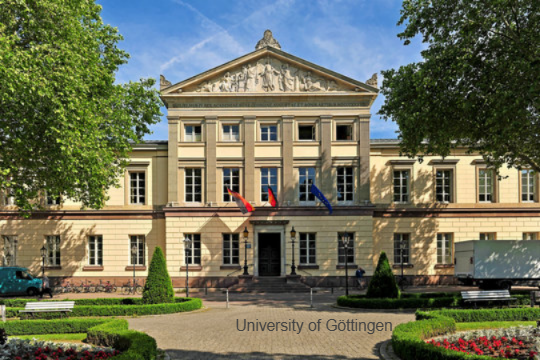Germany has become the go-to choice for students all over the world who are looking to study abroad. Germany not only offers world class education and cutting edge research technology at tuition free universities, it also provides a multicultural atmosphere which help students not feel out of place, no matter where they are from. Germany’s excellence in subjects like STEM, business and social sciences, has made it a top choice for students in 2025, where technical subjects are a priority.
Germany’s Global Appeal for Students
In the last decade or so, Germany has increasingly become a popular destination for students pursuing higher studies. As of 2025, over 440,000 international students have secured their admission in German universities – and this number just keeps growing as the years go by.
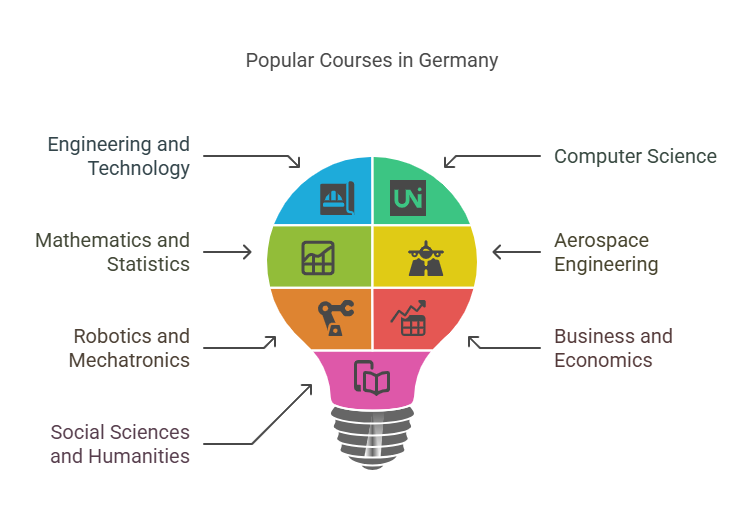
Some of the most popular courses opted by students are:
- Engineering and Technology
- Computer Science
- Mathematics and Statistics
- Aerospace Engineering
- Robotics and Mechatronics
- Business and Economics
- Social Sciences and Humanities
Let’s explore the reasons behind this growing interest in studying in Germany.
Studying in Germany offers:
- High Quality Education
- Low or no tuition fees
- A strong and versatile job market
- Safe, student friendly cities
- An authentically European cultural experience
Tuition Free OR Low Cost Education
One of the main reasons students choose Germany as their study abroad destination, is the fact that public universities in Germany often charge little to no tuition fees. This amount can be further reduced for students who have earned scholarships and have a good profile. Germany offers world class education at the cost of almost nothing-who wouldn’t want that?
How is That Possible?
Germany recognizes education to be an opportunity that should be available to all, regardless of where a person is from. This principle was established by the German Constitution, Grundgesetz – which guarantees the right to education and assigns responsibility for education policy primarily to the federal states – Bundesländer.
Therefore, most public universities in Germany only charge a small administrative fee per semester (approximately €250–€350), which most of the time includes access to public transportation and services provided by the University.
Living Costs Compared to Other Countries
Germany is the most affordable country to pursue higher education for international students, especially when one considers the other options offered to them.
Below is a comparison of the average living expenses in popular regions of study abroad:
| Country | Average Monthly Living Cost (USD) |
| Germany | $950 – $1,100 |
| France | $1,000 – $1,600 |
| Netherlands | $1,200 – $1,800 |
| Sweden | $1,100 – $1,500 |
| United Kingdom | $1,400 – $2,000 |
| Canada | $1,200 – $2,000 |
| Australia | $1,400 – $2,200 |
| United States | $1,500 – $2,500 |
note: The fees structure is liable to change.
Germany also provides Scholarships specifically for International Students:
1. DAAD Scholarships (Deutscher Akademischer Austauschdienst)
- Level: Master’s and PhD
- Coverage: Monthly stipend, travel allowance, health insurance, and sometimes full tuition
- Eligibility: Outstanding academic record, relevant professional experience, and motivation
2. Erasmus+
- Level: Bachelor’s, Master’s, and PhD
- Coverage: Monthly grant + travel costs
- Eligibility: Students enrolled in partner universities in Europe
3. Heinrich Böll Foundation Scholarships
- Level: Bachelor’s, Master’s, and PhD
- Coverage: Monthly stipend + potential allowances for travel and study
- Eligibility: High academic merit, social and political engagement
4. Konrad-Adenauer-Stiftung Scholarships
- Level: Master’s and PhD
- Coverage: €861/month for master’s students; €1,200/month for PhD students + health insurance and travel allowance
- Eligibility: Students committed to democratic values and social responsibility
5. Friedrich Ebert Stiftung (FES) Scholarships
- Level: Bachelor’s, Master’s, and PhD
- Coverage: Monthly stipend + health insurance and family allowances
- Eligibility: Strong academic performance, social and political involvement
Top-Ranked German Universities Offering World-Class Education in 2025
Germany is home to some of the most globally respected universities, most of which consistently rank high in the QS World University rankings. These universities have a special focus on technical and applied sciences and hence offer cutting-edge research facilities, industry collaboration and an extremely competitive curriculum.
Here is a table with the top 10 universities of Germany and what they are best at:
| University | QS Ranking (2025) | Top Prioritized Subjects |
|---|---|---|
| Ludwig Maximilian University of Munich (LMU) | 59 | Medicine, Psychology, Natural Sciences |
| Technical University of Munich (TUM) | 28 | Engineering, Computer Science, Natural Sciences |
| Heidelberg University | 84 | Life Sciences (esp. Medicine), Physics, Humanities |
| Humboldt University of Berlin | 126 | Philosophy, History, Political Science |
| RWTH Aachen University | 99 | Mechanical Engineering, Electrical Engineering, Computer Science |
| Freie Universität Berlin | 97 | Political Science, Humanities, Social Sciences |
| University of Freiburg | 212 | Environmental Science, Medicine, Neurosciences |
| University of Tübingen | 222 | Biology, Theology, Cognitive Science |
| University of Mannheim | 487 | Business Administration, Economics, Social Sciences |
| University of Göttingen | 252 | Life Sciences, Forestry & Agricultural Sciences, Physics |
note: English Taught programs in Germany for International Students
Germany offers a huge number of English-taught Bachelors and Masters programs for international students, making it much easier for international students to pursue their field of interest without having to learn German. Germany also does not require you to sit for the IELTS if you meet alternative language requirements such as a degree in English.
Strong Career Prospects and Work Opportunities
Germany has a strong economy, making it a hotspot for international students looking to work and settle abroad. There is a high demand for employees in key sectors like:
- Engineering (Mechanical, Electrical, Civil)
- Information Technology
- Data Science and AI
- Finance and Accounting
- Environmental and Social Sciences
The country also invests heavily in research and development, making it the ideal destination for individuals looking to build a career in academic and applied research.
Internships while studying
Many programs in Germany include practical training in their curriculum like the Praxissemester, allowing students to apply their theoretical knowledge in practical real-world scenarios. International students can work part-time for 120 full days or 240 half days per year, making it a great addition to their profiles.
What are the options available Post-Graduation?
After completing your studies, you will be eligible to apply for an 18-month post-study work visa in order to search for employment opportunities related to your degree. After which, you can switch to a residence permit or EU Blue Card, which will ensure a hassle-free path towards permanent residency.
Cultural Richness, Safety and Student Life
Germany offers Indian students a dynamic blend of affordable, high-quality education and rich cultural experiences—often outshining the UK and USA. Unlike the high tuition fees in the US/UK, most public universities in Germany charge little to no tuition. Cities like Berlin, Munich, and Heidelberg celebrate multiculturalism through events like Carnival of Cultures and Oktoberfest. Indian food is easily found—from currywurst to butter chicken in Frankfurt’s Little India. Germany also hosts vibrant Diwali, Holi, and Bollywood nights, especially in student hubs like Aachen and Stuttgart. Safer cities, affordable living, and strong post-study work options make Germany a top choice over its Western peers.
Historical and Cultural Diversity
Germany’s historical and cultural diversity offers Indian students a deeply enriching experience. From the medieval castles of Heidelberg to Berlin’s vibrant art scene and Munich’s Oktoberfest, every city reflects a unique identity. Museums like the Pergamon in Berlin and landmarks such as the Berlin Wall and Neuschwanstein Castle provide immersive learning beyond textbooks. The presence of Indian communities, temples, and restaurants across cities like Frankfurt and Hamburg adds a sense of belonging. Combined with tuition-free education, globally ranked universities, and English-taught programs, Germany becomes an ideal destination for Indian students seeking both academic and cultural fulfillment.
Safe and Student-Friendly Cities
The most student-friendly cities in Germany are:
- Berlin – which is known for its diversity, startups, and creative scene
- Munich – a great option for students wanting to lead a naturesque life as it is green and close to the Alps
- Heidelberg – known to be very artsy and historic, perfect for students interested in architecture, design and cultural heritage
- Leipzig and Freiburg – smaller cities with vibrant student communities and more affordable costs compared to the more developed cities.
Germany is located in the heart of Europe, which makes it very easy and affordable to travel across neighboring countries like France, Italy or the Netherlands.
Visa Process and Residence Permit
The Germany student visa process can be relatively smooth and hassle free, provided you have the necessary documents and start the process at least a year before you are scheduled to shift to the country.
Key Requirements
- Admission letter from the German university you are planning to attend
- Proof of funds via a blocked account (approximately €11,208 for one year)
- Valid health insurance
- Completed visa application and supporting documents
You are required to register your address and apply for a residence permit once you arrive, which will allow you to live and work in Germany during and after your studies have completed. This structured approach makes it easier for international students who are planning to study abroad and gives them an organized and stable plan for what to expect in the following years.
Real Student Stories: Studying in Germany
Hanisha from India
Master’s in Finance, Ulm University
“The Master in Finance program at Ulm University is unique in its exposure to all the areas of finance and mathematics required for an individual to work in the industry or to go for further research. It enabled me to learn several programming languages, including R, Matlab, and VBA, as well as data sources like Bloomberg or Datastream. Together with the practical sessions of e.g. stock trading or developing trading algorithms in R, it prepared me very well for my everyday challenges at work.”
After graduating in 2017, Hanisha joined KPMG, focusing on risk management.
Anthony Efonemchi from Nigeria
Master’s in Economics and Finance, Rhine-Waal University
“I decided to come to Rhine-Waal University to do my master’s degree because the program is in English. Doing this program here has been quite interesting and somewhat challenging; it has offered me the opportunity to establish close ties with the lecturers and fellow students as well.”
Germany’s blend of academic excellence, affordable tuition and living costs, rich cultural heritage and diverse job market makes the top choice for students looking to study abroad in 2025. This country has everything you need to take your career to new heights. So what are you waiting for? If you want to secure your spot in a top German university, start by researching programs and gathering all the necessary documents to ensure a smooth visa process.
From top universities to unforgettable personal experiences — Germany welcomes you.
Written by Manjul Kathotia.

